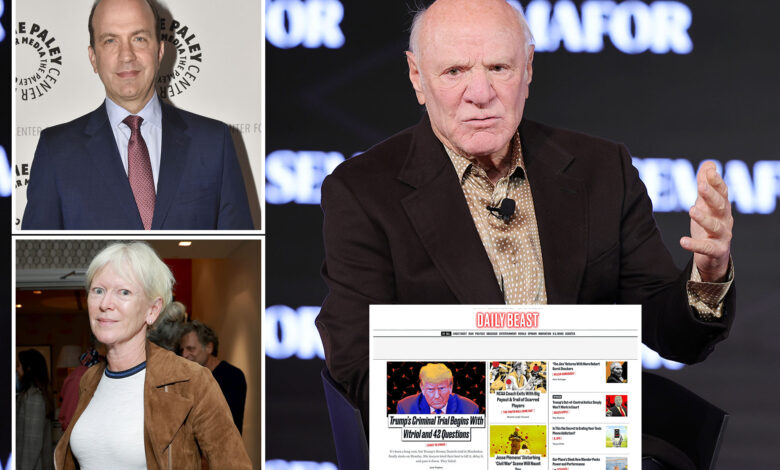Barry Diller teams up with media moguls to revamp Daily Beast

Barry Diller is hoping to turn around his struggling online tabloid The Daily Beast with the help of seasoned media moguls Ben Sherwood Joanna Coles.
Sherwood, a former Disney executive, and Coles, the ex-content chief at Hearst, have both been looking to get back into the media game, according to sources, and Diller had tried to sell The Daily Beast last year to no avail.
Last year, The Post reported that Business Insider co-founder Henry Blodget had met with higher-ups at The Daily Beast, and The New York Times reported that Diller had been trying to clinch a deal with Janice Min, the founder. ofThe Hollywood Reporter and The Ankler.
The duo pitched Diller after several conversations with potential suitors fell through, sources said.
Deal terms were not disclosed but New York Times reported Monday that Coles and Sherwood are grabbing a minority stake equivalent to half of the digital news site with parent-company IAC retaining the majority.
The former president of Disney ABC Television Group and the former chief content officer of Hearst Magazines, will also be salaried employees.
According to The Daily Beast, Sherwood, 60, will grab the reins as chief executive and publisher, while Coles, 61, will become chief creative and content officer.
“These are tough times for digital journalism, but the combined experience, expertise and energy of Ben and Joanna have made me an optimist about their ability to make The Beast an enduring and successful enterprise,” said chairman and senior IAC executive Diller.
Diller told The Times that Coles and Sherwood made a presentation to revitalize the property, which struggled to turn a profit.
“When Ben and Joanna made this presentation, I’d really gotten to the point where I was kind of skeptical that anything would work out, other than selling it,” Diller told The Times. “But I was so impressed with their concept, their energy and their interest.”
outlets in order to bring growth to The Daily Beast. Getty Images
Part of Sherwood’s plan was to evaluate what is working at other publications that have achieved profitability and create their own cocktail of subscriptions, advertising and events/
Sherwood recently built and sold a youth sports company called Mojo, after leaving Disney where he once ran ABC News.
“Timing is everything, and the current media hellstorm feels like the ideal moment to jump back into journalism,” Sherwood said. “Yes, everything feels upside down right now with busted business models and transformative technology. With so much disruption—or maybe because of it—we believe this is the ideal entrepreneurial opportunity to deliver on The Beast’s insurgent promise.”
A former editor in chief of Cosmopolitan and Marie Claire, The British-born Coles began her career in U.K. newspapers, and has a flair of making high-powered connections across industries.
She had been in talks with Sherwood to partner on a digital-media venture that they called “Project Scoop” since 2019. A banker for Diller got in touch, and they wound up pitching a version of the idea to the IAC boss.
Coles and Sherwood see the upcoming presidential election, former president Trump’s legal issues and the the conflict in the Middle East as an opportune time to get back into the news business.
“We’re bringing The Beast back to its rebel roots and will build on its beloved DNA to make it even beastier,” she offered.
Founded in 2008 by the former Vanity Fair editor Tina Brown, with backing from IAC, The Daily Beast had a muckracking culture, landing big scoops on media, politics and national security.
In 2010, The Beast merged with Newsweek in an attempt to marry the website’s digital adeptness with the newsmagazine’s reporting chops, but it was a flop. Diller wound up selling Newsweek in 2013 to International Business Times.
Meanwhile, The Beast, like other digital news sites, has struggled to grow its readership in the face of growing competition and sites that aggregate news. Facebook and Google have also squeezed traffic at digital media sites, impacting advertising revenue.
The scrappy site has also struggled financially, turning to digital subscriptions to grow revenue. Currently, the company charges $4.99 a month for unlimited access to its coverage or $35 a year.
Despite its many hurdles, Diller told The Times that he’s still optimistic about originally reported digital journalism.
“When something is behind a paywall, the barrier is fairly high to get people to say they will actually pay for something,” Diller said. “But guess what? It happens all over the place.”




